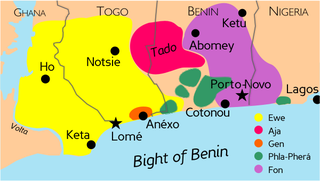You can help expand this article with text translated from the corresponding article in French. (January 2022) Click for important translation instructions.
|
You can help expand this article with text translated from the corresponding article in Spanish. (January 2022) Click for important translation instructions.
|
‹ The template Infobox language is being considered for merging. ›
| Aja | |
|---|---|
| Adja, Hwè | |
| Native to | Benin, Togo, Ghana, Nigeria, Gabon |
| Ethnicity | Aja people |
| Native speakers | 1.28 million (2012–2021) |
| Language family | Niger–Congo? |
| Dialects |
|
| Writing system | Latin |
| Official status | |
| Recognised minority language in | |
| Language codes | |
| ISO 639-3 | ajg |
| Glottolog | ajab1235 |
 The distribution of the major Gbe dialect areas (after Capo 1988, 1991) The distribution of the major Gbe dialect areas (after Capo 1988, 1991) | |
The Aja language is a Gbe language spoken by the Aja people of Benin, Togo, Ghana, Nigeria and Gabon. In Gabon, they are mostly migrants.
it is closely related to other Gbe languages such as Ewe, Mina, Fon, and Phla Phera. Adja is the mother tribe from which the other Gbe people are descended.
Phonology
Consonants
| Labial | Alveolar | Retroflex | Post-alv./ Palatal |
Velar | Labial- velar |
Uvular | ||
|---|---|---|---|---|---|---|---|---|
| Nasal | ŋ | |||||||
| Plosive/ Affricate |
voiceless | p | t | t͡ʃ | k | k͡p | ||
| voiced | b | d | ɖ | d͡ʒ | ɡ | ɡ͡b | ||
| Fricative | voiceless | f | s | ʃ | χ | |||
| voiced | v | z | ɣ | ʁ | ||||
| Approximant | l ~ | j | w | |||||
- Voiced consonants /b, ɖ, j/ are heard as nasal sonorant sounds when followed by a nasal vowel.
- /l/ is heard as a rhotic trill when after alveolar, retroflex or post-alveolar consonants.
- Sounds /s/ and /z/ are heard as post-alveolar , when preceding /i/.
- Approximant sounds /l, w/ may also be nasalized as when preceding or following nasal vowels.
- Some linguists have also attested the nasal sound , and labialized uvular sounds, and , as separate phonemes.
Vowels
| Front | Central | Back | |
|---|---|---|---|
| Close | i | u | |
| Close-mid | e | o | |
| Open-mid | ɛ | ɔ | |
| Open | a |
| Front | Central | Back | |
|---|---|---|---|
| Close | ĩ | ũ | |
| Open-mid | ɛ̃ | ɔ̃ | |
| Open | ã |
Comparison
Article 1 of the Universal Declaration of Human Rights
Aja
Agbetɔwo pleŋu vanɔ gbɛmɛ ko vovoɖeka gbeswɛgbeswɛ, sɔto amɛnyinyi ko acɛwo gomɛ; wo xɔnɔ susunywin ko jimɛnywi so esexwe. Wo ɖo a wa nɔvi ɖaɖa wowo nɔnɔwo gbɔ.
Ewe
Wodzi amegbetɔwo katã ablɔɖeviwoe eye wodzena bubu kple gomekpɔkpɔ sɔsɔe. Susu kple dzitsinya le wo dometɔ ɖesiaɖe si eyata wodze be woanɔ anyi le ɖekawɔwɔ blibo me.
English
All human beings are born free and equal in dignity and rights. They are endowed with reason and conscience and should act towards one another in a spirit of brotherhood.
References
- Aja at Ethnologue (26th ed., 2023)

- ^ Morley, Eric A. (12 March 2011). A Grammar of Ajagbe (PDF).
| Languages of Benin | |||||||||||
|---|---|---|---|---|---|---|---|---|---|---|---|
| Official language | |||||||||||
| Indigenous languages |
| ||||||||||
| Immigrant languages | |||||||||||
| Languages of Togo | |||||||||||
|---|---|---|---|---|---|---|---|---|---|---|---|
| Official language | |||||||||||
| National languages | |||||||||||
| Working languages | |||||||||||
| Indigenous languages |
| ||||||||||
| Volta–Niger languages | |||||||||
|---|---|---|---|---|---|---|---|---|---|
| Ayere-Ahan | |||||||||
| Gbe | |||||||||
| Igboid | |||||||||
| Yoruboid | |||||||||
| Edoid |
| ||||||||
| Nupoid | |||||||||
| Idomoid | |||||||||
| Others | |||||||||
This Volta–Niger language-related article is a stub. You can help Misplaced Pages by expanding it. |